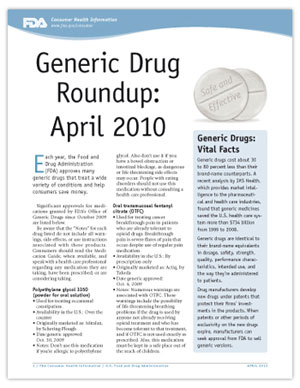Generic Drug Roundup: April 2010
On this page
- Polyethylene glycol 3350
- Oral transmucosal fentanyl citrate
- Ketorolac tromethamine ophthalmic solution
- Lansoprazole delayed-release capsules
- Ibutilide fumarate injection
- Imiquimod cream
- Tamsulosin Hydrochloride capsules
- Generic Drugs: Vital Facts
Each year, the Food and Drug Administration (FDA) approves many generic drugs that treat a wide variety of conditions and help consumers save money.
Significant approvals for medications granted by FDA's Office of Generic Drugs since October 2009 are listed below.
Be aware that the “Notes” for each drug listed do not include all warnings, side effects, or use instructions associated with these products. Consumers should read the Medication Guide, when available, and speak with a health care professional regarding any medication they are taking, have been prescribed, or are considering taking.
Polyethylene glycol 3350 (powder for oral solution)
Used for treating occasional constipation.
Availability in the U.S.: Over the counter
Originally marketed as: Miralax, by Schering-Plough
Date generic approved: Oct. 30, 2009
Notes: Don't use this medication if you're allergic to polyethylene glycol. Also don't use it if you have a bowel obstruction or intestinal blockage, as dangerous or life-threatening side effects may occur. People with eating disorders should not use this medication without consulting a health care professional.
Oral transmucosal fentanyl citrate (OTFC)
Used for treating cancer breakthrough pain in patients who are already tolerant to opioid drugs. Breakthrough pain is severe flares of pain that occur despite use of regular pain medication.
Availability in the U.S.: By prescription only
Originally marketed as: Actiq, by Takeda
Date generic approved: Oct. 6, 2009
Notes: Numerous warnings are associated with OTFC. These warnings include the possibility of life-threatening breathing problems if the drug is used by anyone not already receiving opioid treatment and who has become tolerant to that treatment, and if OTFC is not used exactly as prescribed. Also, this medication must be kept in a safe place out of the reach of children.
Ketorolac tromethamine ophthalmic solution (0.4% and 0.5%)
Used for treating itching eyes associated with seasonal allergic conjunctivitis, an inflammation of tissue lining the eyelids. This condition is triggered by substances such as pollen and dander.
Availability in the U.S.: By prescription only
Originally marketed as: Acular, by Allergan
Date generic approved: Nov. 5, 2009
Notes: This medication is a topical nonsteroidal anti-inflammatory drug (NSAID). With NSAIDs, there is potential for stomach bleeding. The risk increases in people who are older than 60, are taking prescription blood thinners, are taking steroids, or have a history of stomach bleeding.
Lansoprazole delayed-release capsules (15 mg and 30 mg)
Used for treating gastroesophageal reflux disease (GERD).
Availability in the U.S.: By prescription and over the counter
Originally marketed as: Prevacid, by Takeda
Date generic approved: Nov. 10, 2009
Notes: Tell your health care professional if you experience severe stomach pain or diarrhea that does not go away while taking lansoprazole. Also, call your health care professional if you have any other unusual problems while taking this medication.
Ibutilide fumarate injection (0.1 mg/mL [10 mL single-dose vials])
Used for treating atrial arrhythmia (abnormal heart rhythm caused by electrical disturbances in the heart).
Availability in the U.S.: By prescription only
Originally marketed as: Corvert, by Pfizer
Date generic approved: Jan. 11, 2010
Notes: Ask your health care professional about the potential for fatal arrhythmias (abnormal heart rhythms) associated with this medication.
Imiquimod cream (5%)
Used for treating actinic keratosis and superficial basal cell carcinoma. Actinic keratoses are precancerous growths on the skin caused by sun exposure. Basal cell carcinoma, a type of nonmelanoma skin cancer, is the most common form of cancer in the United States.
Availability in the U.S.: By prescription only
Originally marketed as: Aldara, by Graceway
Date generic approved: Feb. 25, 2010
Notes: Since imiquimod cream may make skin sensitive to sunlight, users should avoid exposure to sunlight as much as possible and wear protective clothing, sunglasses, and sunscreen if outside during daylight hours. Users should not use tanning beds or sunlamps. The cream may cause permanent changes in your skin color.
Tamsulosin Hydrochloride capsules (0.4 mg)
Used for treating male urinary symptoms of benign prostatic hypertrophy (BPH)—an enlarged prostate gland.
Availability in the U.S.: By prescription only
Originally marketed as: Flomax, by Astellas Pharma
Date generic approved: March 2, 2010
Notes: Only a health care professional can tell if you have BPH and not a more serious condition like prostate cancer. When beginning treatment or increasing the dose, avoid driving or performing hazardous tasks where injury could result should loss of consciousness occur. Common side effects are runny nose, dizziness, and decrease in semen.
Generic Drugs: Vital Facts
- Generic drugs cost about 30 to 80 percent less than their brand-name counterparts. A recent analysis by IMS Health, which provides market intelligence to the pharmaceutical and health care industries, found that generic medicines saved the U.S. health care system more than $734 billion from 1999 to 2008.
- Generic drugs are identical to their brand-name equivalents in dosage, safety, strength, quality, performance characteristics, intended use, and the way they're administered to patients.
- Drug manufacturers develop new drugs under patents that protect their firms' investments in the products. When patents or other periods of exclusivity on the new drugs expire, manufacturers can seek approval from FDA to sell generic versions.
This article appears on FDA's Consumer Updates page, which features the latest on all FDA-regulated products.
Date Posted: April 21, 2010
Return to FDA Consumer Articles

